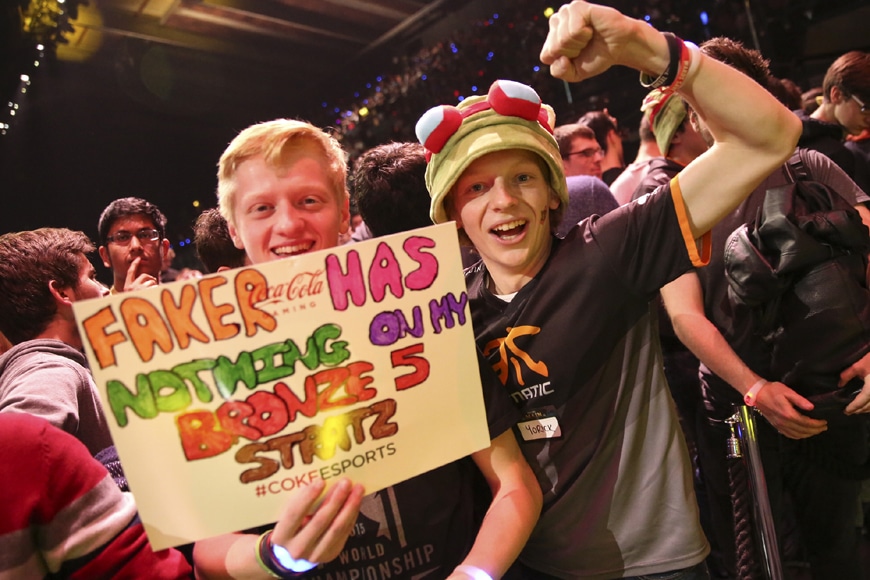When I attended the ESL UK Premiership League of Legends finals in Leicester last December, there was only a handful of spectators in the audience.
It was unsurprising, and probably more due to the fact that ESL advertised ticket sales late, but still disappointing to see.
ESL UK is pushing tickets nice and early this time, and any promotion like this is needed, because the lack of spectators in the UK scene is worrying.
UK League of Legends matches streamed over Twitch usually pull in a few hundred spectators. Last Wednesday, around 500 or so logged onto Twitch to watch the first games of the Premiership this season.
That’s a frustratingly low number considering the number of League fans across the world.
Over the course of all 73 League of Legends World Championship games in 2015, Riot saw an average concurrent viewership (ACU) of over 4.2 million. Plus, there are more than 60 million League players across the world.
Looking broader still, there are over 188 million eSports fans worldwide, with an estimated 240 million by 2018. eSports viewership is predicted to surpass that of the NFL by 2017.
I know the UK is a small fish in a big pond, but bearing the above figures in mind, surely we can do better than a few hundred spectators per game.
When Riot pushed the ESL UK finals in its game client (with both articles and Twitch links), the viewership peaked at around 3,000 viewers. That’s not bad, but it would be nice to see it even higher.
Last year, all four days of the 2015 Worlds quarter finals at Wembley sold out almost immediately. So there is obviously a solid, loyal fanbase here – they just don’t seem to care about their local eSports scene. Why not? And what can be done to better engage them going forwards?
Adam Sellke, CEO of Evolve – a platform that allows experienced gamers and novice players to connect and play together – says that game makers and tournament organisers need to start recognising the ‘non-pro’ in order for eSports to go truly mainstream.
“There are millions of gamers in the UK, but how many of them know that tournaments from ESL, Gfinity and the like even exist? Much more can be done in terms of marketing and promotion.”
“This is how eSports will move beyond spectator status,” he explains. “As eSports and pro players gain popular attention, more and more gamers want to be like them. Golf took off when Tiger Woods became a media sensation. More people took interest and started playing. The same thing is happening with eSports.
“By having opportunities for ‘regular’ players to participate, it adds fuel to the fire for rapid growth, now and in the future.”
He continues: “For eSports to really explode, focus needs to change from the ‘best-of-the-best’ to the common competitor.
“In my opinion, game makers and tournament organizers need to recognize the ‘non-pro’ as the next evolution of competitive gaming. This is how eSports will move beyond spectator status.
“As eSports and pro players gain popular attention, more and more gamers want to be like them. We are at the beginning of the next evolution and growth of eSports as a real sport, and by having opportunities for ‘regular’ players to participate, it adds fuel to the fire for rapid growth, now and in the future.”
So, Selke talks of having both big-name pros to look up to and accessibility for the average spectator. Does the UK scene have those? Probably not the former, but arguably the latter.
But UK eSports – the League of Legends scene in particular – still hasn’t hit the mainstream in this country.
Bigger editorial publications don’t seem to care about it, and while the BBC has done a few things to highlight it, there is no regular coverage as such. PC Gamer recently launched a new eSports section, but gives little to no coverage of the UK scene.
There are millions of gamers in the UK, but how many of them know that tournaments from ESL, Gfinity and the like even exist? In my opinion, much more can be done by these organisers – and their sponsors – in terms of marketing and promotion.
We have some great eSports talent in the UK and a fantastic opportunity to take the local scene to the next level. People talk about wanting to see UK eSports grow – so let’s actually do something about it.
Image source: Riot Flickr

Dom is an award-winning writer and finalist of the Esports Journalist of the Year 2023 award. He has almost two decades of experience in journalism, and left Esports News UK in June 2025.
As a long-time gamer having first picked up the NES controller in the late ’80s, he has written for a range of publications including GamesTM, Nintendo Official Magazine, industry publication MCV and others. He also previously worked as head of content for the British Esports Federation.


